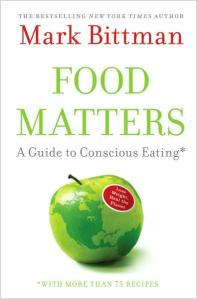One of the things I’ve always tried to share with this blog is my belief that if we make food a priority — i.e. adopt the mindset that delicious, healthy meals are not a luxury — it would do us all a whole lot of good. I think just getting people out of the drive-thru and into the kitchen is a solid first step toward curing the ills caused by the typical American diet. Through his numerous cookbooks and New York Times column, “The Minimalist,” Mark Bittman, one of my foodie idols, makes cooking something fabulous, fresh, and nourishing more often than breaking out the Hamburger Helper seem totally doable. With the voice of a real eater — and in a way that’s accessible — he is also outspoken about why this is important. He is definitely at the forefront of the debate we Americans are currently having about food and our health and the environment — and how all those things are connected.
Last night Bittman spoke at the Tattered Cover Book Store in Denver. He was there promoting his new book, The Food Matters Cookbook, but he didn’t talk about recipes. Instead, he spoke about why food matters (which is the title of his previous book — a book that radically changed that way I eat and think about food, by the way). Food Matters is kind of a manifesto on how our diet affects our health and the health of the planet, with really helpful recipes and other genius ideas for how to change it. The premise is basically this: We (By “we” he’s talking about Americans generally) eat too much meat, processed simple carbohydrates, and junk food; and if we want to be healthy and leave our children a healthy planet, we need to change the way we eat.
The real cost of cheap food.
While food these days seems cheap (Bittman pointed out that Americans spend 7% of their incomes on food, far less than anyone else in the world), its real costs — to the environment and our health — are staggering. The overproduction of meat, processed carbs, and junk is really, really inefficient and is a major contributor to environmental problems such as deforestation and health problems such as obesity and heart disease. And although food seems abundant to us here in the USA, our diet is simply not sustainable; the resources (land, water, oil) required to produce the food we eat are finite and dwindling. When you factor in the impact of our industrial food production on developing countries, things get really unpleasant.
So, other than getting thoroughly depressed, what can you do? Bittman is strongly in favor of a soda tax, which seems to make sense — I mean, soda, like cigarettes, has no nutritional value, is marketed to young people, and it contributes to health problems and deaths, so making it slightly more expensive can’t be a bad thing, can it? But beyond that, I don’t think we can expect our government to legislate what we eat (nor do I think it should, actually) or force corporations to forgo the huge profits they earn by selling Froot Loops and Hot Pockets. Like it or not, that’s not the American way.
Eat like someone who’s not actually insane.
What we all can do, however, is engage in what Bittman calls “sane eating.” Sane eating means choosing quality over convenience and quantity (quantity is obviously not a problem for most of us; the weight of the average American has increased 20% since 1950, Bittman said). Sane eating means not using “I’m too busy” as an excuse for not making a healthy dinner. (If you’re really that busy, let’s talk — there are plenty of ways you can still make something fresh and nutritious in very little time, plus, as Bittman pointed out, what is quicker than eating an apple?) Sane eating means reducing your intake of processed, packaged foods in favor of more fresh, natural ones (“Healthy processed food is an oxymoron,” Bittman said.); it means cutting out junk food (what Bittman calls “UFOs” — Unidentifiable Foodlike Objects) and, yes, soda. And sane eating means drastically reducing your consumption of meat (One fact that got me last night: Americans eat almost 10 billion animals per year, most of which are raised and slaughtered under abysmally inhumane conditions.). For Bittman, it seems like sane eating means eating lots and lots of apples.
But, being sane, Bittman doesn’t suggest we all become vegans either. He calls himself a “less meat-atarian,” and his personal program is to eat nothing but fruits, veggies, whole grains and legumes (i.e. no animal products) until dinnertime, then he eats whatever he wants for dinner. He has lost over 35 pounds in the last three years, by the way. But, he stresses, his program is probably not for everyone. Do what you can to reduce your meat intake. Instead of meat being the main course, make it a side dish or even a flavoring. Or have one or more meat-free days every week. It doesn’t have to be complicated, or even super drastic, to make a difference.
Meat: It’s more than what’s for dinner.
Since this is my blog, I thought it would be appropriate to share a little of my own opinions and experiences with eating meat. First, I get that the whole subject of eating meat is fraught with moral, political, health, and plenty of other complex issues, and I don’t claim to understand all of them. However, looking back on the recipes I’ve shared here, I realized that most of them are meat free or almost meat free. That wasn’t entirely a conscious decision, but I’m not known for my fabulous pot roasts. My meat recipes are just not my favorites, I guess (well, except for garlic Crock Pot chicken and my killer turkey burgers on English muffin buns…). We just don’t eat all that much meat around here, and when we do, it’s pretty basic. And not pretty to look at, either.
I do know that this year for lent, I gave up meat completely and didn’t miss it at all. Plus, I lost weight. Simultaneously my husband got weirded out about industrial meat production (mostly from a health perspective but also because it’s inhumane) and decided to be come a “unless I killed it or know who killed it-atarian,” which, as you can imagine, greatly reduces his (and our) meat intake. Thankfully for him, he’s a hunter and fisherman, and he has never been that big of a meat eater. So we eat wild game, wild fish, and occasionally meat from the farmer’s market. It’s a bit more expensive, but if you’re eating less of it (see Sane Eating above), you’ll still probably come out ahead.
I don’t think meat eating itself is morally wrong, even though I love animals. I am, however, kind of against torture. If you haven’t done so, maybe take a few minutes to educate yourself about the treatment of animals on industrial farms (A good place to start is by reading Eating Animals by Jonathan Safran Foer, but only if you’re not squeamish.). If you do that and think about those animals’ life and death, as well as the consequences for your own health and the planet, it might just give you pause long enough to reconsider that pork chop. Or perhaps it will motivate you to make the Pasta with Seared Roma Tomatoes and Ricotta from Bittman’s amazing-looking new cookbook. That book’s 500 recipes should keep you eating sanely — and happily, too — for a very long time.



Great post, Bevin. I also love Mark Bittman and his thoughts and opinions. Our meat-eating habits are similar to yours. Not having much hunting time the past few years, we’re thankful for gifts of game from friends with overflowing freezers! However, I don’t think I could give up our occasional cornish hen (they’re pretty small so I’m hopeful they don’t go through any inhumane feeding treatments and choose to think they’re more free-range than the typical fryer – should probably research this but I’m just not ready to give up this special meat treat). And then there’s lamb……it’s probably time to refill the freezer with a locally-raised, grass-fed lamb and support the local rancher. I can’t wait to check out Mark’s new cookbook and to add some new dishes to my repertoire.
“And then there’s lamb…” yes, lamb is the only meat I would miss if I were I true vegetarian! Luckily I have a friend with a connection, but it’s not cheap — nor should it be I guess, since it is lamb after all!
Another reason to eat less meat? It’s cheaper. I like the term: “eat-less-meat-atarian.” Suits me well. There is a scene is Food Inc when the cow is about to slaughtered and he looks from his filthy crowded stall right into the camera like he’s trying to plead for HELP. I can’t get it out of my mind. It definitely made me eat less meat. A lot less meat.